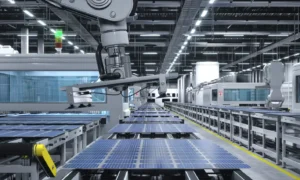For farmers across Africa, water availability is crucial for their crop production. But about 600 million people in Africa still don’t have access to grid electricity. Thus, relying solely on rainy seasons can limit farming yields to just twice a year. That’s where solar irrigation systems come in.
As we all know, solar power has become an essential solution, especially in areas with abundant sunlight. These systems are not only the best source of irrigation but also offer reliable and clean energy options. With these agricultural water pumping systems, as a farmer, you can plan better to maximize your stocks.
If you, too, are a farmer and want to maximize crop yield, invest some time in checking solar system prices in Kenya. It will help you find suitable solar-powered solutions in your budget.
Also, this blog will help you explore the potential benefits of solar agricultural water pumping systems so you make an informed decision. Let’s dive in:
Solar Agricultural Water Pumping Systems: An Overview!
Solar agricultural water pumping systems have gained popularity as eco-friendly irrigation solutions. These systems harness the power of the sun and help you supply water to your crops. Besides being a sustainable alternative to conventional methods, it also reduces water consumption and minimizes excessive reliance on fossil fuels.
Let’s take a closer look at the key components of a solar agricultural water pumping system:
- Solar panels: These panels capture sunlight and convert it into electricity, making them the most essential component of a solar system.
- Inverter: It plays a crucial role in the system by converting the direct current (DC) electricity generated by the panels into alternating current (AC).
- Water Pump: These pumps are responsible for extracting water from a well or other water sources and delivering it to your crops.
- Controller: It acts as a regulator, managing the flow of electricity from the solar panels to the water pump. In other words, a must-have tool. You can check solar charge controller prices in Kenya for a good deal.
How Do Solar Water Pumping Systems Maximize Your Crop Yield?
In Kenya, the use of solar-powered water pumping systems is increasing among farmers. While people are using LED lights in Kenya to light up their houses, a survey of 2018 suggests only 1% of farmers in Kenya used solar water pumps that year. However, experts suggest that by 2023, that number is expected to reach 10%. The reasons behind this growth are:
● Rising Electricity Costs
● Government Support and Subsidies
● Embracing Solar Advantages
Now let’s check out how these agriculture pumping systems can maximize your crops:
- Reliable Water Supply: Relying on traditional pumps in rural areas is a big mistake. On the other hand, installing solar water pumps in the fields can be an excellent solution as these systems are powered by the sun and provide a consistent and reliable power supply. Even during power outages, you can be confident that your crops won’t go thirsty.
- Water Conservation: Solar-powered irrigation pumps are also efficient as they use less water in comparison to traditional ones. It not only saves you money on water bills but also helps to conserve precious water resources. So by optimizing water usage, you are ultimately promoting sustainable farming practices.
- Improved Crop Quality: With a consistent water supply, your crops will flourish as these solar water pumps ensure that your crops receive the right amount of water, promoting healthier and stronger growth. Thus, this will improve crop quality, higher yields, and greater profitability.
- Environmental Sustainability: Another advantage of Solar water pumps is their eco-friendly nature. They produce zero emissions of harmful gases and reduce pollution. So by installing solar-powered systems, you can also contribute to a cleaner and greener future.
- Low-Maintenance and Hassle-Free: These water pumps require minimal maintenance, as they have a longer lifespan of 20-25 years. Thus, it helps you save time as well as money. Also, installing these systems is quick and easy; you can do it yourself or get it installed by a qualified technician.
- Long-Term Savings: Solar water pumps are a financially wise investment. You can utilize free and renewable energy from the sun by reducing the need for costly electricity. Thus this helps you to save on energy bills in the long run.
At last!
This was pretty much all about solar agricultural water pumping systems and how they can benefit farmers in the long run. Therefore, for the farmers, having one solar water pump can be a game changer in the industry.
If you are living in such an area, you must get it installed and save electricity. Along with this, you can also get led strip lights in Kenya, as these lights can also harness the power of the sun and add modern effects to your home.




































